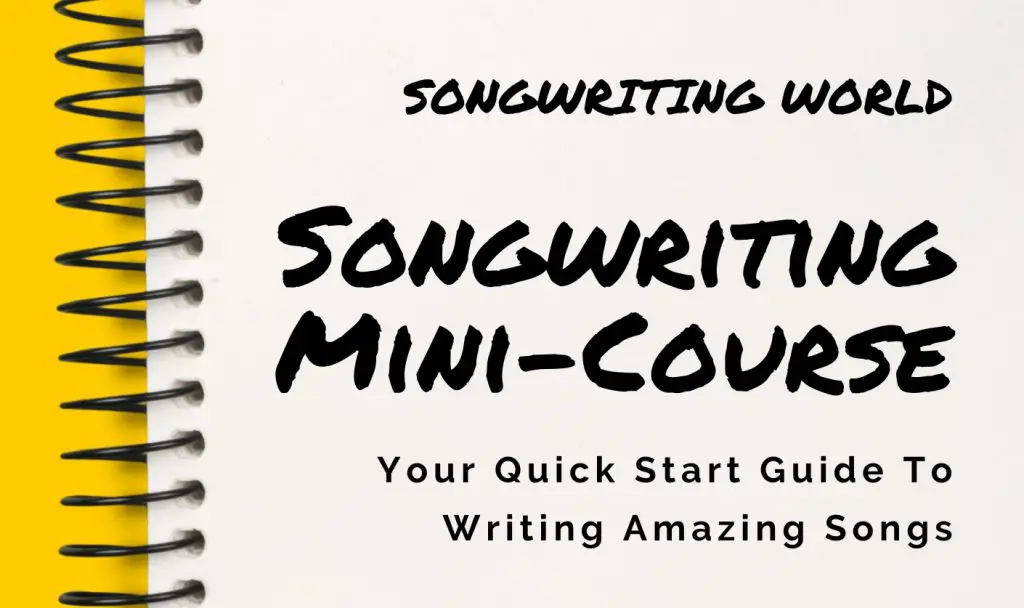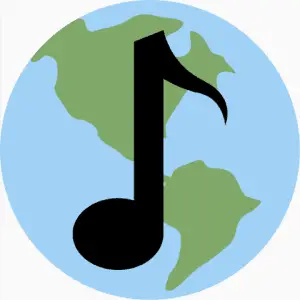
In this Songwriting for Non-musicians Guide I’ll share how you can get started writing your own songs. Can non-musicians become songwriters? Yes! In fact, many famous singers and songwriters do not know how to read music. It is not even necessary to know how to play an instrument such as guitar or piano.
Writing songs is primarily about expressing a feeling, emotion, or idea through music. In fact, the most important part is having the desire to write a song.
This is why even non-musicians can write great songs that people love to listen to.
Of course, it is helpful if you can play an instrument and if you have some knowledge of music.

In this Songwriting For Non-Musicians Guide I’m going to assume you have very little musical knowledge. You don’t need to know anything about music other than “I like music!” to get started.
There is also a bit of creativity needed if you want to create song after song..
However, it is not necessary and every skill you need can be learned (even by non-musicians) – I’ll tell you why:
Songwriters create the structure for the music
I’ve met many talented musicians who struggle to write songs.
It is not because they aren’t good at playing their guitar, it’s because they don’t know how to create their own complete musical ideas.
To write songs you must have an idea that you want to express.
Then you put the different parts of that idea together with music and words.
Finally, at the end you’ll have a complete musical idea (a song).
The most important part for a songwriter is to create the “skeleton bones” that the musicians will follow when performing the song.
I’m talking about the song structure which is described with words like:
Verse / Verse / Chorus / Verse / Chorus / Bridge / Chorus / Outro
If you want to know all of the parts of a song, check out this article that explains the name and function of every song section.
Now that you know your main job is to create the structure, you can change your focus on how to actually put everything together.
Start with an idea and expand it to a complete song
Many would-be songwriters quit before they even get started.
After the initial spark of inspiration they don’t know what to do with the catchy chorus or interesting verse they created.
It used to happen to me as well – I’d get a great idea and jot it down on a napkin at the coffee shop or, better yet, sing it into my phone.
When I got home it was like the well went dry and I wasn’t able to finish the idea.
The name of the game is learning how to EXPAND your ideas so they can be complete.
What does “complete” mean? In my view, it just means having a song that is satisfying to listen to at the end.
A satisfying song takes you on a journey. Not every part sounds the same. There are some interesting lyrical ideas to explore.
OR it can just have a good energy and vibe, like a simple dance song that is repetitive but fun.
Ultimately, you are the judge of when your song is finished.
It helps to be able to create variations on the initial ideas you have when you’re getting started. Luckily, this is something you can learn.
Create different sections of your song
The two most basic parts of a song are the melody and the music that supports that melody.
A melody is the notes or pitches that you hear more than any other part of the song. It’s the most important thing “happening” at any given moment in the song.
Usually, the lead singer will have the melody. Sometimes other instruments can have the melody too, like when there’s an extended guitar solo or musical break.
The other part is the underlying music, also known as the accompaniment.
This includes ALL the other instruments playing at the same time as the melody.
In a typical pop / rock band these are some of the instruments you’ll find:
Drum set
Electric or Acoustic Guitar
Bass Guitar
Keyboards and Synthesizers
Piano
Singer / Vocalists with multiple parts
Writing Lyrics for your song
The lyrics are the words that the person is singing.
Lyrics are probably the most important part of your song, although not necessarily.
(A lot of dance music lacks lyrics, for example.)
The reason they’re so important is because the lyrics will contain the melody.
If you have an idea for a song and sing something to yourself, you are creating the lyrics and the melody at the same time. This is usually how lyrics are written.
However, you might write your lyrics separately and add the melody afterwards. This is how poetry can be turned into a song.
Help with writing song lyrics
If you need help or a bit more inspiration with lyrics, it helps to ask open-ended questions.
This allows your mind to “fill in the blanks” and produce more ideas you can use in your writing.
“What message or idea or feeling are you trying to get across?”
“What feeling inspired the song and what feelings do you want the listener to feel?”
“Do you want this to be upbeat and energetic? Slow and relaxing?”
The specific words you use will evoke certain images and feelings.
Keep this in mind as you’re writing the lyrics.
For instance, the word “shatter” is different than the word “broken” even though both have much of the same meaning.
Personally, I like to tune in to the basic message of what I’d like to express. Once I establish those basic things I can generate more lyrics for the verses and chorus.
Most important sections of a song
The Verse and the Chorus are the most important sections of a song. Why? Because they’ll take up most of the listener’s time.
The Chorus is especially important because it repeats several times in most songs.
You’ll want it to be interesting to listen to otherwise the listener will get exhausted and stop paying attention.
When writing your song you’ll want to create the right balance between presenting a musical idea and adding variation.
People tend to like things that are familiar and dislike things that are too different from what came immediately before.
Keep this in mind as you write your song. If it all sounds the same, it’ll be difficult for the listener.
If there’s a nice balance between new and old, the listener will like going back to something familiar.
This is mostly accomplished by going back and forth between the Verse and the Chorus.
The Verses will change lyrics but have the same basic melody. The Chorus will have the mostly the same lyrics every time and the same melody.
Finally, you might be wondering about the underlying music or accompaniment I mentioned earlier.
The melody will help you determine what the chords (the music) should be.
The melody (notes that you sing in your lyrics) has certain pitches that are contained within certain chords which belong to a musical key.
(This is the part where it helps to be a musician or have the help of a musician.)
When you know what musical key the notes you are singing “belong too” you will be able to determine what chords to play.
Trust me, this is not the most difficult part of the process. Writing your verses, chorus, and melody is the most important part!
Here’s what you can do instead of trying to figure out what chords to play…
Start with a pre-made chord progression and start humming along. The notes your are humming or singing are the melody!
(Check out this article with several complete chord progressions you can use.)
If you don’t know what to sing, just sing a syllable such as “la.” Yes, you’ll be singing “la la la.”
You can also use nonsense words or simply “placeholder” words that don’t need to make sense. The job is to create a melody that sounds good with the chords.
Sometimes you’ll discover you can write the final lyrics and melody at the same time.
Many songwriters do this and it’s a skill you can learn and practice to perfection.
By the time you get a very clear idea of the structure of the song (Verse, Chorus, etc.) and the lyrics.. You’ll have a finished song!
If you’ve made it this far, you should congratulate yourself!
I hope you’ve enjoyed the Songwriting for Non-Musicians Guide. Is there anything else that you wish I covered? Let me know in the comments!
If you haven’t checked it out yet, read this article that explains all the parts of a song. It will help immensely!
